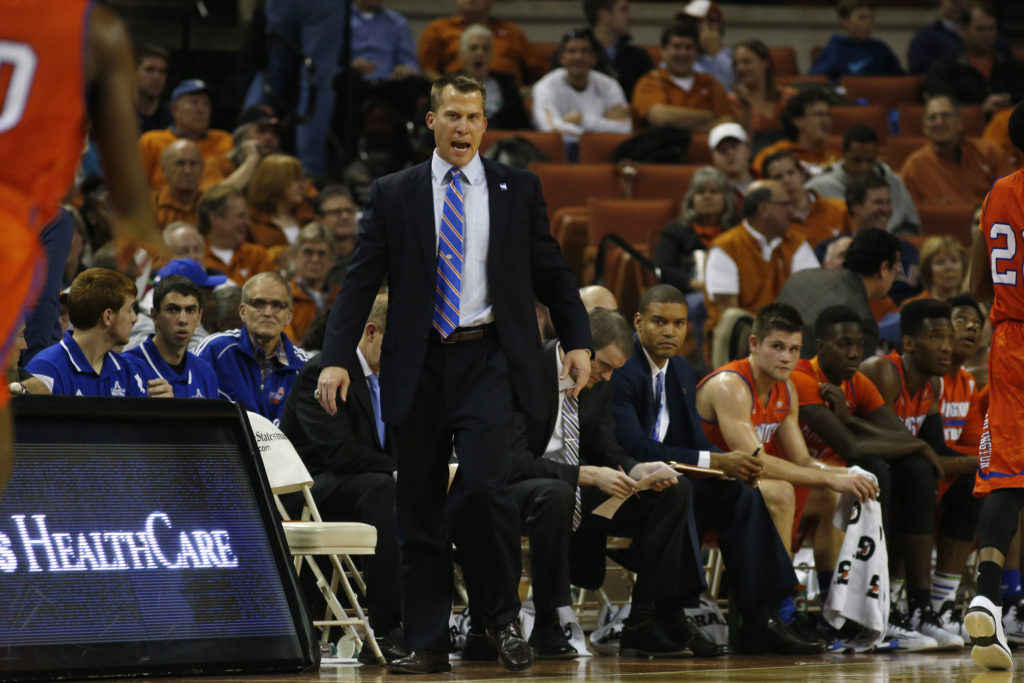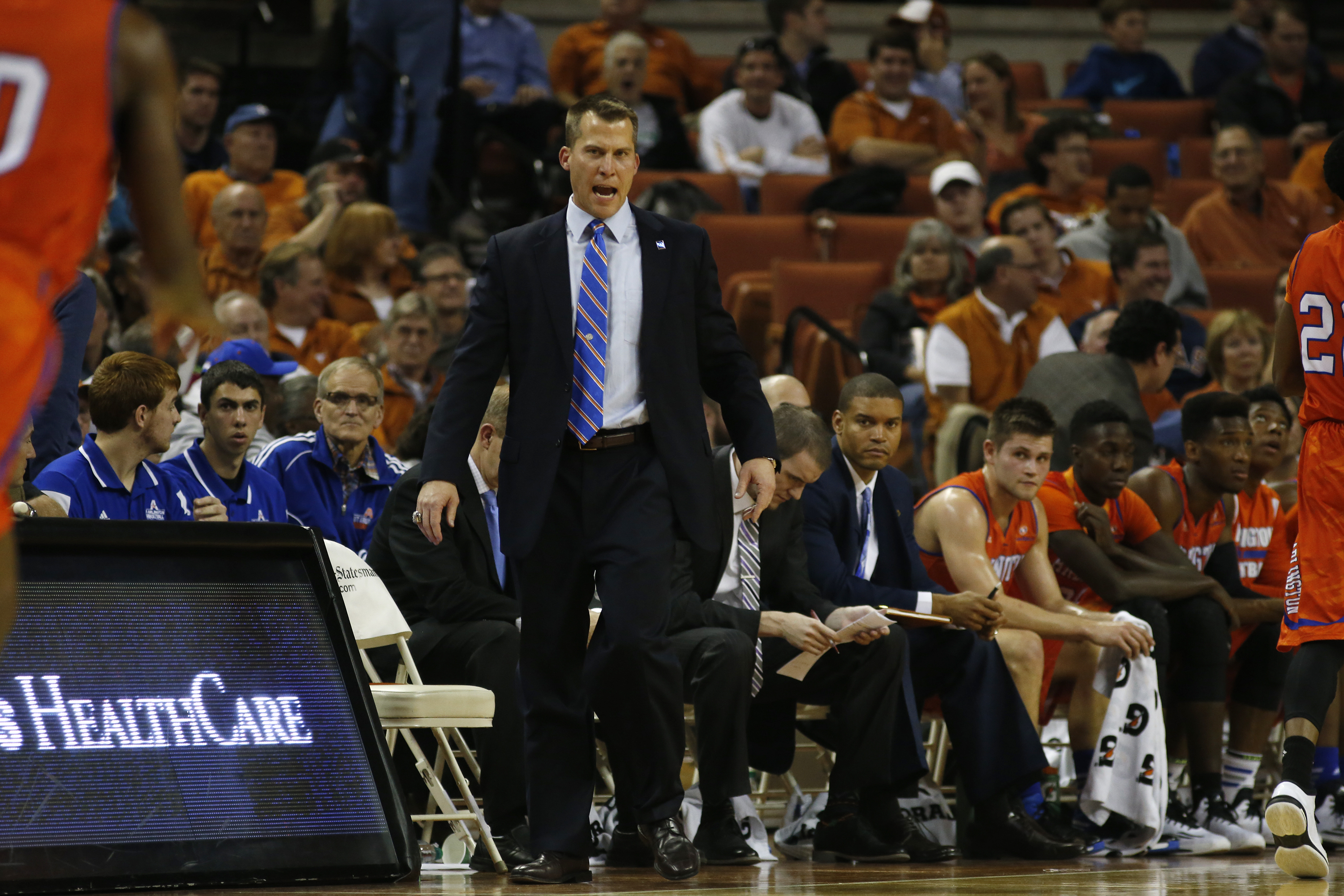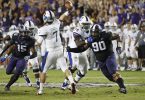
AUSTIN, TX – DECEMBER 2: Head coach Scott Cross of the Texas-Arlington Mavericks yells instructions to his players as they play the Texas Longhorns at the Frank Erwin Center on December 2, 2014 in Austin, Texas. (Photo by Chris Covatta/Getty Images)
It wasn’t the best night for Scott Cross or for his coaching future, even if he didn’t know it at the time.
Cross and his UT Arlington Mavericks had just been ousted in the semifinals of the 2016 Sun Belt Conference tournament. Athletic director Jim Baker and other members of the staff were gathered outside the locker room at Lakefront Arena in New Orleans, waiting for Cross to exit on his way to the postgame press conference.
Baker’s phone buzzed, he looked down and the disgust was immediate. He motioned over to a senior department official, who shook her head, mirroring Baker’s reaction. They had seen texts like this all too often from the same source and were tired of them.
Later that night after many beers on Bourbon Street, Baker pulled out his phone again to share that text with a wider audience. The sender was UTA president Vistasp Karbhari and the message was so elementary and sports naïve that it’s hard to believe it came from a civil engineer who’s made a career in academia.
The gist: Tell Scott not to fall behind so much early because it takes too much energy for the team to come back.
This is a tale about Scott Cross, the only coach in UTA’s long and largely wretched men’s basketball history to find success and accomplish anything of value. And of Jim Baker, a first-time AD who systematically brought in “his” people in an effort to reshape an otherwise inconsequential program. And of Vistasp Karbhari, a first-time university president with little regard or understanding of athletics.
This is a tale that I can tell, because I was there for a lot of it, a member of the athletic department from 2012-2016.
With Baker and Karbhari in place, Cross never really had a shot. Unless he won like Kansas in the Big 12, Cross’ days were always numbered.
Karbhari’s (lack of) sports knowledge had been a sore spot for athletic department officials from the moment he took over for popular former president James Spaniolo in 2013. Senior department officials openly mocked Karbhari and his accent – he’s of Indian descent – for opinions such as the one above and for tightening the purse strings on an already paltry athletic department budget.
Baker didn’t sign up to work for Karbhari. Effectively placed in the UTA job by former Texas athletic director DeLoss Dodds in early 2012, Baker arrived in Arlington after 20 years beside Dodds in Austin with sports-loving Spaniolo in place, a men’s basketball program on the rise and a new arena set to open.
The future of UTA athletics appeared, at least from the outside, to be bright. Inside the College Park Center walls, it didn’t take long for the lights to dim for many, including Cross.
The sudden retirement of Spaniolo, a longtime champion of men’s basketball, caught the university by surprise when it was announced in the summer of 2012. Of the finalists being interviewed for the presidential post, Baker told his staff that Karbhari would be the least favorable to athletics.
Baker was right.
Karbhari, who attends UTA sporting events with his head buried in his phone, pored over every line of the athletic department’s budget and questioned expenses at every turn. The scrutiny was a disconcerting about-face for athletic department officials who for years operated under Spaniolo’s rubber-stamp financial policy.
Baker felt the strain, which trickled down throughout the department. As Baker struggled to figure out how to please Karbhari, it soon became evident to many UTA coaches that life as they knew it at UTA was changing.
The changes at first seemed to be warranted, but they added up quickly. The softball coach was soon gone. The boot followed for the heads of women’s basketball, golf and volleyball. No one really noticed those moves.
If anyone appeared safe, it had to be Cross. After all, he created whatever basketball tradition a program that had existed for decades on a stage had. Not a good stage. An actual stage in a rundown campus theatre.
The landscape gradually changed under Spaniolo. College Park Center, with its 7,000 seats and in-house practice facility, opened in 2012. The move from the Southland Conference to the WAC to the Sun Belt meant a step up in competition, which also had its recruiting benefits. Cross finally had some of the assets his coaching peers had enjoyed for years.
The Mavericks started to win at a rate the program had never enjoyed before. UTA went 43-23 in the first two seasons that College Park Center was in use. What can’t be lost is that UTA is an all-time losing program. No coach in school history owns a winning record. Except for Cross.
But the deck was also stacked against Cross, with the pressure mounting from Baker/Karbhari. The budget, already the among the lowest in the Sun Belt, was micromanaged even further.
The financial guarantees that Cross was required to bring in were raised to the $300,000-range per season. Playing three to four big-time programs for cash isn’t a recipe for on-court success.
The women’s basketball program, by comparison, was only required to play one guarantee game for about $20,000.
“Obviously we could pull in more money, but it was bullshit that we had to schedule three to four losses a year and they didn’t,” a former men’s staffer said.
Scheduling losses is one thing. Not being able to schedule near-certain wins is another. Men’s basketball was given the mandate to play no more than one non-Division I program a season. Fellow Sun Belt programs don’t operate under the same restrictions.
Team travel became a joke, a hodgepodge of draining bus rides, connecting flights and budget hotels. Men’s basketball was forced to raise the money to pay for its 2015 summer tour to the Bahamas with its travel party heavily restricted. The women’s program wasn’t under the same constraint, as Karbhari found funds to cover the team’s trek to Costa Rica last summer.
The uneasiness that existed between the men’s basketball program and administration exploded after the best season in UTA history. The Mavs won the Sun Belt regular season championship in 2016-17, reached the NIT quarterfinals and won a school-record 27 games.
Plenty to celebrate. Not for Baker, who stewed on the negatives. The biggest sin was not winning the Sun Belt tourney title, thus not earning an automatic NCAA bid.
Baker blew up during his post-season meeting with Cross. Never mind that UTA beat big brother Texas in Austin that season. Forget that UTA beat a ranked opponent for the first time ever, stunning No. 22 St. Mary’s on the road. (UTA beat Ohio State and Memphis on the road the prior year.) Baker couldn’t come to grips with the 21-point loss to Texas State in the Sun Belt semis.
Baker wanted UTA to become another Gonzaga. Yes, the same Gonzaga that pays coach Mark Few $1.9 million per season. The same Gonzaga that can afford to buy games against schools like UTA. The same Gonzaga that operates and earns like a college basketball blueblood.
UTA is light years from being Gonzaga. UTA is a commuter school with little presence or brand awareness in Arlington, much less DFW. UTA isn’t a diamond in the rough. It’s the rough.
Baker, nonetheless, made his expectations clear to Cross for this past season: NCAAs or trip to Madison Square Garden for NIT Final Four. Anything else and his job would be in jeopardy.
Cross didn’t receive a contract extension after the Sun Belt regular season title and those 27 wins, which is almost unheard of in college basketball. The men’s staff knew after that meeting that it was only a matter of time before they would be blown out. Baker would later say that he and Cross didn’t see “eye to eye” on the direction of the program.
The Mavericks came into this past season as the Sun Belt favorites, a top 10 mid-major team picked to win the league with a senior-lead squad led by future pros Kevin Hervey and Erick Neal. A promising start in non-conference fizzled once Sun Belt play began, as the Mavs struggled to a 10-8 mark. UTA nearly salvaged an underachieving season by reaching Sun Belt tournament championship game on March 11 – one step away from Baker’s NCAA promised land – only to lose to George State by 13.
The season ended at 21-13, the program’s third consecutive 20-win season. UTA only has seven 20-win campaigns ever, five coming under Cross. The 72 wins over the last three seasons are the second most by any team in Texas.
But there was no NCAA or NIT bid coming. Baker had his out, not to mention an eye on Texas Tech assistant Chris Ogden. They had worked together at Texas and it was no secret within UTA men’s basketball that Ogden was already in line to replace Cross. Never mind that Cross had two years left on his contract.
On March 15, four days after UTA’s season ended, Baker had an up-close view of Ogden in action at Texas Tech’s first-round NCAA Tournament game in American Airlines Center. He was seated five rows from the Red Raiders bench. A UTA spokesman tried to explain away Baker’s attendance at the game, saying he was at the game with a UTA athletic department employee with ties to Texas Tech.
The optics weren’t lost on those still tenuously employed at UTA.
Texas Tech saw its NCAA run end on March 25. The next day, at 2:48 p.m., the call came. Baker wanted to meet with Cross, who was out recruiting earlier that day. A staff meeting for the entire department was on the books for 3 p.m. The Cross meeting was quick and to the point.
Baker said it was a tough decision, one he needed to sleep on. (Not so coincidentally, he went to sleep that previous night knowing Ogden was in the clear.) A change needed to be made, Baker concluded, and Cross was relieved of his job.
Social media blew up, but it wasn’t just UTA faithful that denounced Cross’ firing. ESPN analyst Fran Fraschilla roasted Baker on Twitter, vowing never to step inside College Park Center again. Jeff Van Gundy used his ESPN TV platform to take Baker and Karbhari to task during an NBA game, specifically the idea that UTA could be Gonzaga.
Pay like Gonzaga, treat your players like Gonzaga, Van Gundy chided. Van Gundy punctuated his points with “Stop the nonsense” and “Dream on!”
Cross’ dismissal was immediately followed with Ogden’s imminent arrival, despite Baker’s pledge that UTA would conduct a “national search” for the next head coach. UTA insiders laughed at that empty promise. On the day Cross was let go, Ogden made sure to get the word out to potential UTA recruits that he was in play, national search be damned.
Lost in the coaching shuffle was the 11 days between the end of UTA’s season and Cross being cut lose. Had he been fired the day after the Georgia State loss, Cross many have a shot at other open jobs, such as South Alabama.
“The way Baker fired Cross, waiting that long, was gutless,” the former staffer said.
Baker didn’t waste time lowering the expectations for Ogden, saying that it would take at least a couple of years to rebuild. (It’s also no secret within the UTA athletic department that coaches hired by Baker have a much longer leash than those he inherited.) Ogden’s NCAA-or-else directive apparently won’t kick in until maybe 2021.
Cross didn’t have that luxury.
Cross reached a financial settlement on the final two years of his contract, sources said, worth approximately $400,000. UTA’s all-time winningest coach went 225-161 in his 12 years, going to the postseason five times, including the school’s lone NCAA berth in 2008.
Cross played for UTA, graduated from UTA and spent his entire coaching career, including eight years as an assistant, on the UTA sideline. Baker has said he wants to induct Cross in the department’s Hall of Honor one day.
Luckily for Cross, attendance at that banquet isn’t required.






